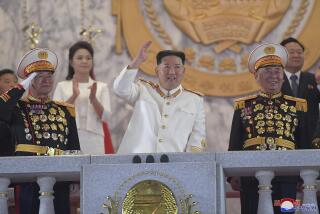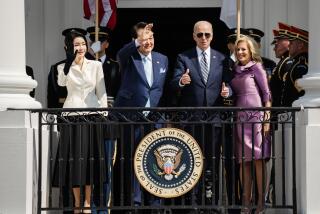Major Violence May Yet Rock S. Korea, U.S. Warns
- Share via
WASHINGTON — The Reagan Administration, although relieved that widespread demonstrations in South Korea on Friday occurred “without anything of a tremendous tragic nature occurring,” cautioned that political turmoil there could yet degenerate “into violent confrontation.”
At the same time, Edward Derwinski, an under secretary of state, said that a consensus emerging in Seoul points to the replacement of President Chun Doo Hwan with an interim president. He s1634296864until Chun’s term ends in February, but another State Department source said that there is talk of Chun’s leaving office sooner than that.
At the end of a tense week in South Korea, where 40,000 American troops are stationed, U.S. officials are saying that they see some reason for optimism, despite the shards of glass, the rocks and tear gas that have become symbols of the confrontation between government and opposition.
‘Signs of Flexibility’
“There have been some small signs of flexibility, which we hope are indications that the government will make further concrete positive moves,” said Assistant Secretary of State Gaston J. Sigur, after reporting to President Reagan on a just-completed visit to South Korea. Sigur added that Reagan is “fully confident” that the South Koreans will move toward “a more broadly based political system.”
“This is not a time for intransigence,” Sigur said. “We urge tolerance for peaceful demonstrations, release of people in prison for political activities, an end to preemptive arrests and house arrests.”
It was Sigur who noted that there was nothing during Friday’s demonstrations “of a tremendous tragic nature occurring.”
Another State Department official pointed to Sigur’s remarks at a press conference as an illustration of the delicate but direct pressure that the Administration is putting on Seoul to commit itself to significant internal changes and reach an accord with the opposition, which demands constitutional changes that would allow the direct election of that nation’s president. Chun has persisted in maintaining an indi1919247220opposition insists will allow the president to handpick his successor.
Rather than expressing criticism, Sigur’s remarks focused primarily on simple adherence to principles of civil liberties. Nevertheless, said the State Department official, who asked to remain anonymous, “These are pretty major things considering how the (South Korean) government has been working in general.”
The Administration has chosen a non-confrontational approach because of the complexity of its relations with South Korea. Reagan Administration officials, and particularly those at the Pentagon, view the border between South and North Korea as a live wire, making the Administration wary of raising any questions about its commitment to the security of the south.
Despite the Administration’s displeasure with Chun and his government, “There are no fireworks because fireworks are not the solution there,” the official said.
Although Administration officials were willing to talk privately Friday about the possibility of Chun’s leaving office, they were careful not to endorse any particular option.
No Show of Irritation
The Administration expressed no open disgruntlement over the return to house arrest of leading dissident Kim Dae Jung and the momentary detention of Kim Young Sam, head of the main opposition party. Kim Dae Jung had been freed from house arrest during Sigur’s visit to Seoul.
A State Department official said diplomats here recognize that containment of Friday’s demonstrations took first priority with the Chun regime.
“If it’s a choice between spitting in Washington’s eye and keeping the demonstration from getting out of hand, there’s really not much choice,” he said.
More to Read
Sign up for Essential California
The most important California stories and recommendations in your inbox every morning.
You may occasionally receive promotional content from the Los Angeles Times.













